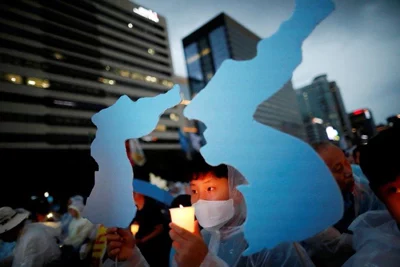AT 9am tomorrow at the Capella Hotel on Singapore’s Sentosa Island, United States President Donald Trump will be the first sitting US president to meet with the supreme leader of North Korea.
This would be unheard of a year ago, where no one would have thought a US-North Korea Summit possible. The reasons for this change could be because Trump’s pressure campaign had paid off, or Kim Jongun has completed his nuclear weapons and missile programme, or somewhere in between.
If indeed Jong-un has completed his nuclear weapons and missile programme, the US would have to address North Korea’s breakthrough in missile technology — this could mean that the entire continental US is within range of a strike. For the North Koreans, this new diplomatic outreach is predicated on developing its economic agenda now that it has acquired its “powerful treasured sword”, and satisfied its primary security needs.
While the summit is considered an accomplishment, there cannot be great expectations of what it would achieve. On the one hand, North Korea would not denuclearise without adequate security guarantees, and sanctions being lifted, and on the other, the US does not appear to have the appetite for anything other than a quick solution.
Besides, and almost as important is the difference in the manner and pace of denuclearisation envisioned by the US and North Korea. As it stands, the US insists that North Korea undertake a complete, verifiable, irreversible denuclearisation of its nuclear arsenal, a manner aligned with all five United Nations Security Council Resolutions on North Korean nuclear proliferation since 2006.
Relatedly, US Defence Secretary James Mattis had stated at the Shangri-La Dialogue that, “North Korea will receive relief only when it demonstrates verifiable and irreversible steps to denuclearisation”. But to what extent would these “verifiable and irreversible steps towards denuclearisation” have to be demonstrated before the US provides relief? Verifiability would require North Korea to disclose the sensitive locations of its nuclear and missile facilities to international observers, and irreversibility would mean the nuclear facilities would be made almost impossible to restart in the future.
It is hard to imagine that North Korea would unilaterally take these steps, and lose its primary means of defending itself without anything in return.
Besides, by now, Jong-un would have fully appreciated the leverage afforded by his completed nuclear weapons and missile programme, which in turn, serves to guarantee North Korean’s security and regime stability—his two foremost interests.
North Korea actually refers to denuclearisation in terms of the entire Korean peninsula. What this means is that in exchange for North Korea relinquishing its nuclear weapons and missile programme, South Korea would have to withdraw from the US’ nuclear umbrella.
In addition to that, guarantees would also have to be made by the US that North Korean denuclearisation will not result in regime change, nor its security threatened. This would most likely mean the withdrawal of US troops stationed in South Korea, as well as the cessation of the annual US-South Korea military exercises.
If North Korea were to get its way, denuclearisation would most likely be a drawn out, phase-by-phase affair. This would involve reciprocal measures such as the loosening of sanctions, obtaining economic aid, and receiving security guarantees from the US in return for a phased denuclearisation on its part.
Complicating discussions further would be the mutual distrust between both sides — with the current White House administration’s decision to withdraw from the Joint Comprehensive Plan of Action with Iran, and North Korea’s well documented history of backtracking from agreements.
The fact of the matter is that Pyongyang’s diplomatic outreach has already resulted in two inter Korean Summits with South Korea’s President Moon Jae-in, whose administration is being perceived as overly optimistic in embracing the North’s conciliatory position.
More importantly, Jong-un has met with China’s President Xi Jinping twice in Beijing and Russia’s Foreign Minister Sergey Lavrov in Pyongyang, shoring up relations with key allies prior to the USNorth Korea Summit.
While the US-North Korea Summit will add another layer of dialogue that could perhaps move the status quo forward, expectations for it to result in a denuclearisation plan are unrealistic.
With that, peace on the Korean peninsula will probably remain a far-flung goal despite appearing to be the “flavour of the day”.





